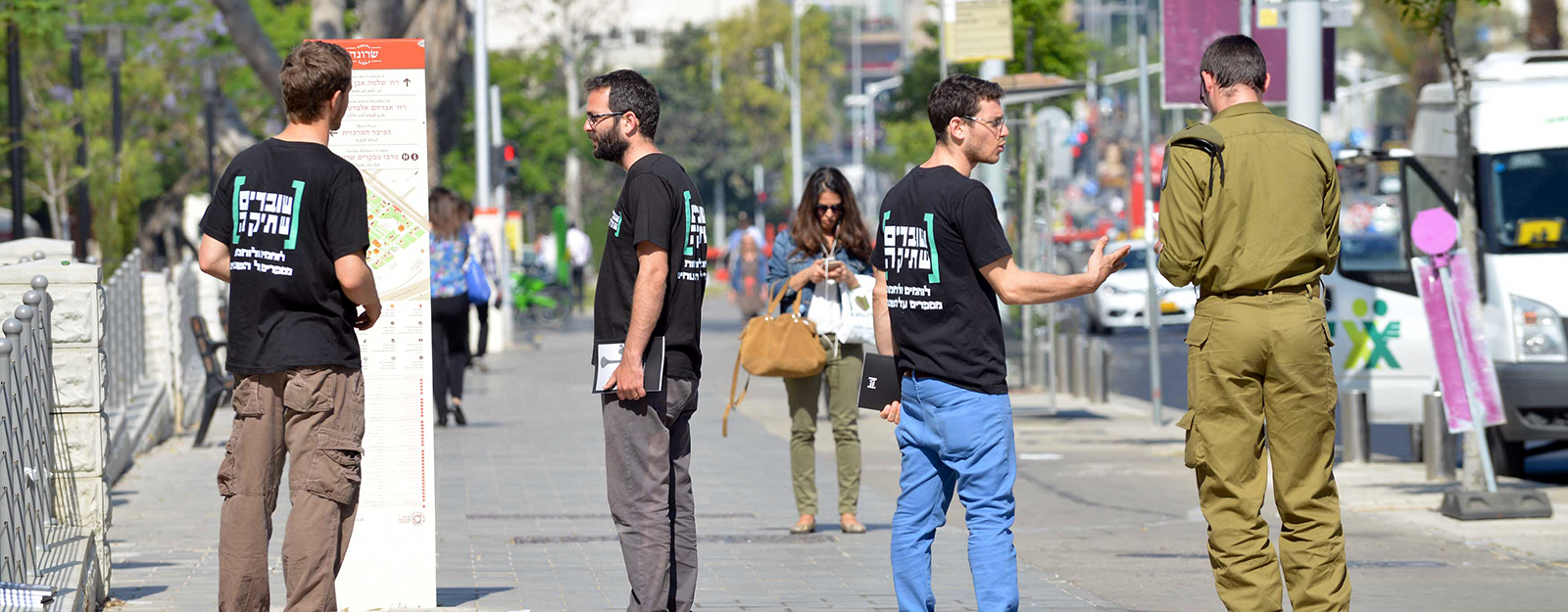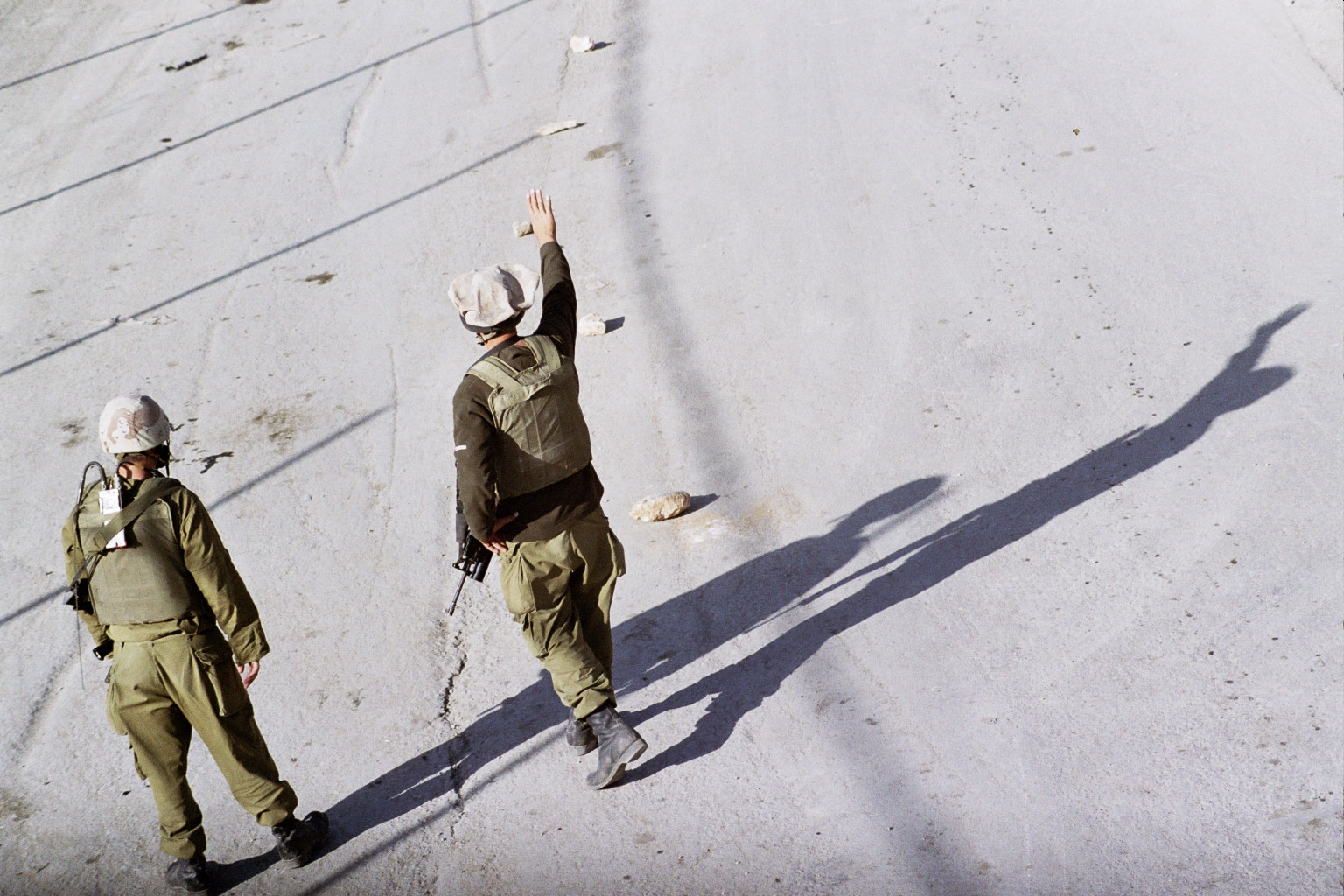What do the relations between the soldiers and the settlers in Hebron look like in your experience? In my platoon, I think that a lot of guys, there was a lot of awareness of right and wrong. I think, the relations... It came from a few different places, it came first of all and prior to anything else from the attitude they displayed toward the Palestinians, whether it was the [settlers’] children who would throw stones at Palestinians near the 'Red House' (one of the Israeli settlements in Hebron that is a combined military base and residential compound for settlers), and their parents who don’t care. First example. [Or] whether it was how settlers would intervene in events, in [operational] call-ups, in [Palestinian] terrorist attacks, in all kinds of things that happen, intervene and try to change the reality that our officers decide [on], that’s second. And third, one of the things that we were really angry about, [was] that settlers determine the policy on the ground; what does determine policy on the ground mean? For example – settlers from the Red House, I’ll give [an explanation] here for those who of course don’t know, on Fridays and weekends and holidays, you take the whole of the Zion Route,1 which connects [the settlement of] Kiryat Arba to Hebron and the Tomb of the Patriarchs, and you 'sleeve' it – that’s what it’s called in the military slang – with loads and loads of soldiers, usually in basic training, so that the settlers from Kiryat Arba can walk on the Zion Route without any Palestinian cars, they’re not allowed [to drive], like with confidence that Palestinians won’t hurt them, all the way to the Tomb of the Patriarchs below. So very very significant manpower is invested so that they (the settlers) have this sleeve every weekend. The Red House settlers weren’t satisfied with walking on the Zion Route, like everyone else, they decided that they want to walk to the Tomb of the Patriarchs through a Palestinian neighborhood, which means what? That every Friday, the front command squad, sometimes the front command squad couldn’t, so then it was the Red House civilian emergency response team; of course, there’s no need to say, soldiers who hardly get any sleep, barely three hours per day, would have to come and escort a bunch of settlers, with ### at the lead, and the rest of the Red House residents, sometimes they brought friends and family from outside Hebron, and their settler children – and walk through the Palestinian neighborhood, of course provoking [people], even if they didn’t say anything, of course [it’s] provocation, a crowd of settlers and soldiers walking into the Palestinian neighborhood, there’s no doubt this is serious provocation. Every time on a Friday [we had to] take them down to the prayers and bring them back home from the prayers. Why? There’s no reason, purely to make their presence felt in the Palestinian neighborhood, they have a whole sleeve that exists especially for them, they brought guys in basic training to stay the weekend so that [the settlers occupying the Red House] can go down to the Tomb like everyone else. Why do we do it? Because that’s their request and it’s – not because it’s a request, because that’s what they’ve decided. And I remember that none of the settlers told us this explicitly, but we knew with certainty that from their perspective their attitude was "Don’t come with us, we don’t need you, we have pistols, I don’t need a soldier to protect me." This kind of contempt. They didn’t really believe that we were a serious security force. "We’re going, do what you want." It was a very clear feeling and understanding that we weren’t deciding whether the settlers would pass through the Palestinian neighborhood, it’s a really stupid decision and really bad in security terms too; they decide they were going – "if you want to, escort us, and if you don’t – don’t escort us." And it was clear that the company commander had no say against the settlers, it was clear that there wasn't anything he could say to them. If they’ve decided they’re walking through this neighborhood, then they are. It was clear to me that no officer would go and tell them: Listen, I don’t have the manpower [needed] for this, it doesn’t make sense, it’s not operationally [sound], and it’s not safe, don’t do it. You have the regular route that everyone has. It was clear this wasn’t going to happen.
I don’t understand, I’m the IDF, I control Hebron, [so] there are rules. Does this mean that if a Palestinian decides to walk wherever he wants, the IDF will let him? No.
Meaning, you have the ability to stop people from doing things. Absolutely. The ability is there, [but] the desire is to stop Palestinians from doing particular things. And that will simply isn’t there when it comes to settlers. What brings this about, is the chumminess and the reciprocity, the fact that the deputy company commander and the company commander and all the top brass in the battalion are friends of the settlers in Hebron. That’s just undoubtedly what brings this about, it was clear to us that he (the commanding officer) has dinner with him (the settler) on Friday evening and a second before that would he tell him: Listen–; an hour before he comes to his place, Friday dinner, and to play with his children, would he tell him: Listen, you’re not going [down there], we’re not bringing you a force and you’re not going down through the Palestinian neighborhood. It’s clear to me that that’s not going to happen. *
Since 2000, Palestinian vehicles have been prohibited from driving on this road. Following a petition to the Supreme Court, in 2011 the IDF decided to implement a number of 'humanitarian relief measures', including opening the Zion Route to Palestinian residents who live on the road, have passed extensive background checks and who hold an Israeli mechanical license and have bought insurance from a recognized provider. As of 2021, around 70 vehicles hold this permit.









 testimonies
testimonies  media & content
media & content 










 IT WAS CLEAR THAT THE COMPANY COMMANDER HAD NO SAY AGAINST THE SETTLERS
IT WAS CLEAR THAT THE COMPANY COMMANDER HAD NO SAY AGAINST THE SETTLERS 

 terms of use & privacy policy
terms of use & privacy policy